from here: http://creation.com/billions-of-years-christians-dumb
A brilliant way to muzzle Christians: Get them to believe in long ages
Published: 23 April 2013 (GMT+10)

Or more accurately, as it turned out, a non-debate.1
It happened this way.
Two men, Bill Crabtree and David Falconer, approached the University’s chief executive, vice-chancellor2 Professor Alan Robson, with a proposal that the university hold a debate in which both sides of the Anthropogenic3 Global Warming (AGW) controversy would be represented.
The vice-chancellor readily agreed. And why not? Such a debate would be right in line with the university’s ongoing commitment “to engage with the wider community to establish strong links and cement its position as a leading intellectual and creative resource to the communities it serves.”4 And the international nature of the debate fits the UWA’s statement that, “The University thinks globally in preparing its students to be citizens of the world” with its multi-nation institutional partnerships which “promote a lively exchange of staff, students, knowledge and ideas.”5 Not to mention that one of the ‘core values’ underpinning the UWA’s activities is a commitment to: “academic freedom to encourage staff and students to engage in the open exchange of ideas and thought.”6
A great Public Relations opportunity?
No doubt Vice-chancellor Robson also had an eye to the tremendous PR opportunity such an event—‘The great global warming debate!’—would provide his university. Professor Robson suggested that the debate be structured to last for 90 minutes, with two speakers on each side. Messrs Crabtree and Falconer said the two presenters to speak against the AGW argument would be:- Mathematician and engineer David Evans, who from 1999 to 2005 had worked full-time for the Australian Greenhouse Office (now the Department of Climate Change) modelling carbon in plants, debris, mulch, soils and forestry and agricultural products.
- Retired meteorologist William Kininmonth, who had worked with the Australian Bureau of Meteorology for 38 years in weather forecasting and research—for 12 years until 1998 he was head of its National Climate Centre.
Vice-Chancellor cools on his global warming debate promise
Alas, after having initially given the go-ahead for the global warming debate, the university’s vice chancellor suddenly got ‘cold feet’, saying that no speakers could be found for the pro-global warming side and that the speakers that Crabtree and Falconer had organised (Evans and Kininmonth) were not credible enough to speak at a debate on the UWA grounds.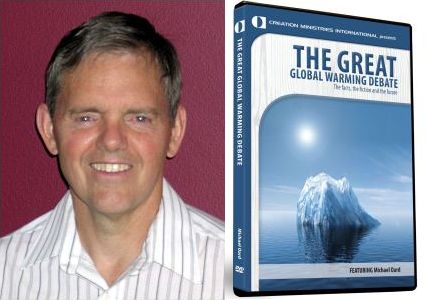
Human induced global warming? Meteorologist Michael Oard
has spent much of his retirement going through the evidence with a
fine-toothed comb—and
his measured assessment of the controversy might surprise you.
“I am open to the idea [of a debate]”, Professor Robson explained, “but getting speakers lined up that were credible on both sides was difficult. It is very hard to line up speakers on either side that were credible and that is why I decided to pull the pin on it because I just couldn’t see that we were going to get very high quality speakers. Some of those people that Bill Crabtree suggested, if I had invited them into the university there would be an enormous uproar, because they had shared platforms with people such as Lord Monckton. There was also a difficulty in getting people on the side of the IPCC. Those people don’t want to get involved in a debate.”
Don’t want to get involved in a debate. That’s when it hit me that the humans-caused-global-warming scaremongers weren’t interested in debating the other side at all, but only in suppressing them.
And that’s just what I also observe with the creation/evolution ‘debate’.
Evolutionists don’t want to debate!
For example, when CMI, months in advance, offered the organizers of the international 2010 Global Atheist Convention in Melbourne the opportunity to pit their best evolutionary proponents (surely perhaps Richard Dawkins?, PZ Myers?, and/or Peter Singer?—they were all attending the Convention) in a formal public debate against the same number of CMI’s scientists/speakers, we got a rejection back the very same day. The rejection didn’t surprise us (but perhaps the speed did). See World atheist convention rejects Australian creationist debate challenge.For the wrath of God is revealed from heaven against all ungodliness and unrighteousness of men, who by their unrighteousness suppress the truth.“Suppress the truth.” That’s what it’s all about. Silencing the Christians, muzzling them.
Creation—you can’t even mention it
Examples of rendering the Christian voice silent abound in the secular media—see ‘Origins questions’—evolutionists puzzled, creationists muzzled. Rather than engaging calmly and intellectually on the issues, such as design (Romans 1:20), they often resort instead to malicious (Romans 1:29), senseless (Romans 1:31), arrogant name-calling (Romans 1:30). [This is very much in evidence in the incoming comments to our online articles—we usually publish a subset of these as an example, but there are many more received that we cannot publish as the foul language is unprintable on a family website.]And it’s not just the secular media. In the UK, with the support of Parliament, moves to silence the teaching of creation in schools have been increasingly successful—see Evidence for Creation now banned from UK religious education classes. In the USA, though creation is not ‘banned’ as such in schools, American atheists frequently cite the ‘freedom of religion’ clause of the US constitution as meaning no biblical teaching in the classroom.9
In Australia, though as yet there’s no (real or perceived) constitutional impediment, the secularist pressure to muzzle the Christian voice is very much in evidence. For example, we received this letter from a grandmother:
Grandson Jacob’s teacher gave the ‘party line’ on origins yesterday. “Two massive clouds of cosmic gasses collided and as a result our sun emerged…”
Jacob raised his hand and interrupted, “I don’t believe that!”
“I beg your pardon, Jacob? Why not?” she asked.
“Because there was nothing but GOD and He just spoke and that’s where our sun came from” was the simple faith of this 8-year-old.
The teacher responded: “You know, Jacob, you are right. I don’t believe it [evolution] either. It happened just like you said but I’m not allowed to say it [creation] as a teacher. Thank you for saying it for me.”When I share that grandmother’s story with congregations around Australia in my church presentations, in church after church there are teachers who come up to me to say:
“Yes! That’s exactly how it is at my school, too. The principal read the ‘riot act’ out to us in the staff room: no mentioning creation in class, unless one of the kids asks us a question, raising the issue. Only then may we talk about it.”Not allowed to even mention creation in class? Sounds like the school authorities have been influenced by the likes of Lawrence Krauss, author of the recent book, A Universe from Nothing: Why there is Something rather than Nothing. Krauss has more than once equated the teaching of creation at schools to ‘child abuse’:
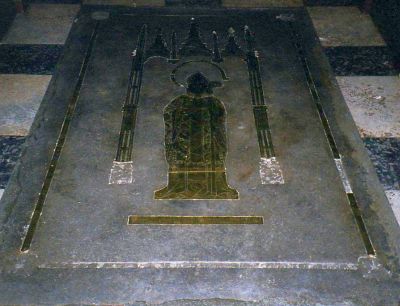
|
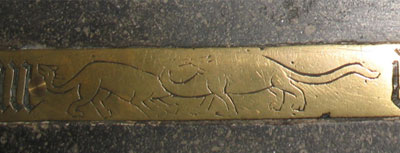
|
The 600-year-old tomb of Bishop Bell at Carlisle
Cathedral, UK, has brass engravings of what appear to be sauropod
dinosaurs. They appear to be engaged in a fight
with their necks (as is also typical of giraffe behaviour) or perhaps
courting displays, also familiar within the animal kingdom. Whoever
engraved them all those centuries ago
clearly wasn’t copying from the Encyclopædia Brittanica! Photos by Philip Bell.
|
“Well, I’ve recently, in the United States, just stated that teaching creationism is child abuse and I think it is.”10Other leading atheists, e.g. Richard Dawkins, have echoed similar sentiments. And it’s not just the Christians that atheists want to stop from talking about creation. Even among their own number, i.e. their fellow evolutionists, they have insisted that the topic not even be raised. Look what happened to one evolutionist who, reasonably enough, suggested it would be sensible to allow students to debate evolution. The following extract is from Andrew Halloway’s 2008 article11 Reiss resigns as Royal Society stifles debate on evolution:
This week, in Britain, we have had the highest profile proof that even a hint that your views on evolution might differ from those of the scientific establishment is enough to force you out. Prof. Michael Reiss, an evolutionist and the Royal Society’s director of education, resigned under pressure (given the push) within a couple of days of merely suggesting that creationism and ID could be discussed in classrooms—even if it was in order to explain why they were, in his view, wrong.12
Immediately, atheistic scientists called for him to be ousted, claiming he was wanting creationism to be taught as an alternative to evolution. This was not his position, so he was not pushed out because of what he actually said, but because other people misrepresented what he had said. The Royal Society should have defended Reiss against those who were twisting his words, but instead they gave in, thus saving their own reputation for evolutionary orthodoxy.
Note, at the risk of repetition, that Reiss is an evolutionist himself. He was simply saying it was OK for pupils to express their own opinions. He said, ‘There is much to be said for allowing students to raise any doubts they have—hardly a revolutionary idea in science teaching—and doing one’s best to have a genuine discussion.’13
Despite his obvious support for evolution, Reiss received a torrent of abuse.
But doubts about evolution are not allowed. Scientific evidence that counters it is ruled inadmissible. So, despite his obvious support for evolution, Reiss received a torrent of abuse from other top-level scientists and members of the Society for even suggesting that evolution could be debated.
Alas, some Christians, too, would silence their brothers
Sadly, I meet Christians who would also seek to muzzle the Christian voice on the origins issue.For example, at a church-hosted creation/evolution seminar recently, a man hurried to speak with me immediately I finished presenting the first session.
“I’ve got no problem with most of the material you presented,” he said politely, “but you’re wrong to say the Earth is only 6,000 years old. It’s billions of years old. You need to adjust your material accordingly—or at the very least, never say that the Earth is only thousands of years old.”
Later I found out from others in his church who were also attending the seminar that he is an elder in their church. As a lay preacher he was known for periodically addressing the congregation about evidence for design in nature, and about the origin-of-life difficulty without an Intelligent Designer.
Image: Dr Mary Schweitzer
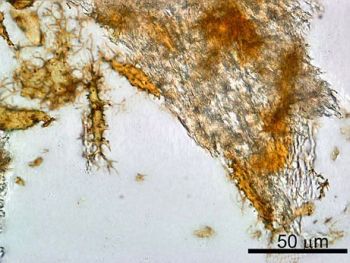
The finding of pliable blood vessels, blood cells and
proteins in dinosaur bone is consistent with an age of thousands of
years for the fossils, not the 65+ million
years claimed by the paleontologists. For more see Dino soft tissue find—a stunning rebuttal of ‘millions of
years’.
“On what basis do you say the Earth is billions of years old?” I asked. “You saw in the first session what I presented about soft tissue in dinosaur bones, and the problems with radiometric dating.”
He replied that he wasn’t here to talk about technical aspects or scientific evidence—he said that I would know more than he does on those aspects. Rather, he said that ‘day’ can mean a long period of time, e.g. in the phrase “In my father’s day … ”.
By now a substantial number of people were crowding around—some waiting for their own chance to speak with me personally, others perhaps just wanting to ‘listen in’ on the unfolding conversation. Conscious of those waiting patiently for their turn, and mindful that I would need to begin the second public session soon, I mentally mapped out my desired concise interaction with the gentleman. I.e. first deal with the “in my father’s day” misconception, then cite Exodus 20:8–11 and Jesus on the age of the Earth, then in parting direct him to chapter 2 of The Creation Answers Book: “Six days? Really?”
I presented to him the following sentence:
In my father’s day,
it took six days to drive across Australia,
driving only during the day.Then I said, “We’re surely both in agreement that the first instance of ‘day’ [in the first line of the above sentence] can mean a period longer than an ordinary 24-hour day. But what about ‘it took six days’—how long was that?”
The gentleman agreed with me that it meant a period of six, ordinary days—the time taken for the Earth to rotate on its axis six times. But when I asked, “What is it from the text that tells you that?”, he couldn’t answer. Or it might be more correct to say that he wouldn’t answer. It started to become embarrassing, the fact that we were stalled on this point for some minutes. I tried everything I could to coax, to cajole, to encourage him to speak to this key question.
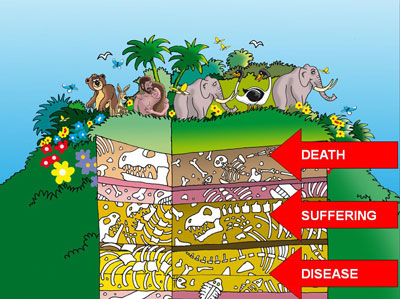
At the close of the Creation Week, God called everything He had made ‘very good’ (Genesis 1:31). This is powerful evidence against the wrong idea
(illustrated above) that long ages of suffering and dying took place before the first man and woman, Adam and Eve, appeared.
“Come on sir, I’m sure you can do it. I ask congregations this all the time, and they, although perhaps sometimes having to give it a little thought, are able to answer correctly. This sentence is just words and letters on the page, d-a-y = ‘day’; it’s the same word in all three instances. Irrespective of whatever language you translated this sentence into—whether d-a-y in English, or h-a-r-i in Indonesian, or in Hebrew yod-waw-mem-sofit (יום)—here [i.e. in the second line], as you say, it always means an ordinary 24-hour day. But what’s the key; how can you know it from the text?”
He started to look very uncomfortable, and for a moment I actually felt sorry for him, because it seemed possible that he genuinely couldn’t see the reason why “six days” meant six ordinary 24-hour days. But then someone at the back of the still-growing crowd gathering around shouted out, “Because when ‘day’ appears with a number, it always means an ordinary day!” However, still the gentleman remained doggedly silent, evidently unwilling to acknowledge the point. Now that I had no doubt that he certainly knew the answer, but wouldn’t say it, I pressed for him to address it head-on, saying, “Sir, it’s really important that you can see this for yourself, you must say it yourself, speak it out of your own heart … ”, but it was to no avail. Instead, he endeavoured to present another objection, viz. that “there was no sun before the fourth day, so the Genesis days cannot have been ordinary days”.
If only he had been game to willingly ‘travel’ with me through the rest of my intended “In my father’s day …” argument, he’d have certainly seen that there’s a simple answer to his Days-before-the-sun ‘objection’, too.
Silence isn’t golden, when souls are at stake
One problem with accepting the secular billions-of-years timeframe is that it defrauds the Christian15 of the capacity to give a proper answer (as per the injunction of 1 Peter 3:15) to the crucial, oft-asked question of: “Why is there death and suffering in the world today, if God is good?”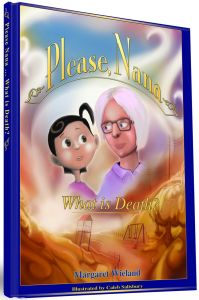
Young children exposed to their first-ever animal death, and distressed by it, intrinsically know that something isn’t right, though ignorant of the
event in history which caused it. The above book, Please Nana, what is death? is a
great way to equip them with an answer (as per 1 Peter 3:15)—and thus circumvent any erroneous influence from millions-of-years-believing adults.
That’s because it puts the ‘fossil record’ before the appearance of man on the Earth.
I.e. it means carnivory, disease, death and thorns preceded the sin of the first man Adam, in direct contradiction of God’s Word. (See: Drawing power: people get the point when they see these two pictures.) In a previous article, I wrote of a long-age Christian school Principal’s “Life’s tough, kid” response to a child grieving the death of a cherished pet. An atheist would have hardly answered any differently! (So much for the biblical counsel to eschew worldly wisdom—e.g. 1 Corinthians 3:18–19, 2 Corinthians 10:5.)
Indeed, although credit is due to the Christian school Principal and the “in my father’s day” gentleman for their public professions of Christ and an Intelligent Designer, such was the fervor of their strident opposition and hostility towards me in our conversations on the age-of-the-universe issue that I have thought privately in the heat of the moment: “These are my brothers?!? Yet on this issue they’re fighting me just like the most diehard of atheists!”
Surely the famous words16 from the book The Chronicles of the Schönberg-Cotta Family, by novelist Elizabeth Rundle Charles (1828–1896), are relevant to the age-of-the-Earth issue:
“If I profess, with the loudest voice and the clearest exposition, every portion of the truth of God except precisely that little point which the world and the devil are at that moment attacking, I am not confessing Christ, however boldly I may be professing Christianity. Where the battle rages the loyalty of the soldier is proved; and to be steady on all the battle-field besides is mere flight and disgrace to him if he flinches at that one point.”17
Whoever is slack in his work is a brother to him who destroys.The thing is, there’s no need for Christians to be ‘slack’ in addressing what has become erroneously known by long-age compromising theologians as the ‘problem of natural evil’ in the world, as the following articles show. CMI wrote and published these articles in response to the worldwide news interest in the catastrophic December 2004 tsunami, the stingray-barb death of ‘crocodile hunter’ Steve Irwin, devastating Australian bushfires and floods, and the Haiti earthquake disaster. Amid the widespread grief at those times, people were asking, “Where is God in all this?” Our web-visit counter ‘went ballistic’ as the reader surge very quickly rocketed these articles into our ‘most read’ category, with excited and grateful reader feedback confirming we’d very clearly ‘struck a nerve’:
- Waves of sadness: tsunami terror raises age-old questions
- The stingray of death: the tragic end of the life of crocodile hunter Steve Irwin
- Australia’s season of disasters
- Haiti’s horrendous earthquake disaster
Atheists are loud when ‘big-name’ Christians are mute
abc.net.au/tv/qanda
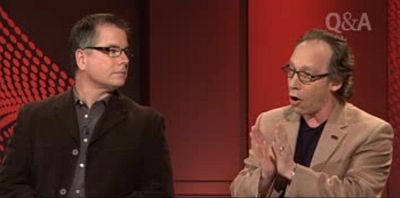
John Dickson (at left) and Lawrence Krauss on the ABC’s Q&A program, February 2013. The ‘blogosphere’ was active for days afterwards as
Christians and atheists argued as to who had ‘won’ on the night.
TONY JONES: John Dickson?
JOHN DICKSON: Yeah. This is going to be an agree fest, I think.
LAWRENCE KRAUSS: Great.
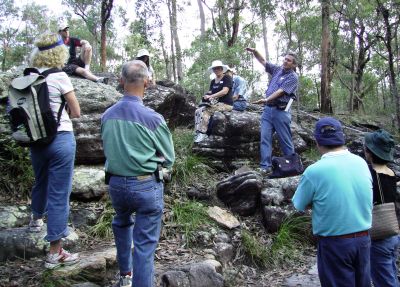
CMI—Australia’s Dr Tas Walker, leading a geological tour.
He has several times personally offered to meet John Dickson over a
coffee to discuss
Genesis with a view to coming to mutual agreement as per the scriptural
injunction (1 Corinthians 1:10; 2 Corinthians 13:11)
for brothers-in-Christ to “be of one mind.”
(Tas has offered to fly to Sydney from Brisbane at his own expense, to
facilitate that.) But so far John Dickson is yet to take up the offer.
Tas has also recently posted the
following on Facebook:
“I’d like to talk to John Dickson one day about the science: natural selection, mutations, fossils, strata, the geologic column, uniformitarianism, K-Ar dating, the nebular hypothesis, because the science supports the six-day, 6,000-year biblical history. It is vital to be more discerning about what people who represent themselves as scientists say, and not believe their every pronouncement as gospel.”
JOHN DICKSON: I agree but for one thing that I think lowers the tone. On the science I totally agree and you’ll find that most mainstream Christians are very comfortable with science and with all of the discoveries of science, including that 13.72 billion years ago there was a bang and evolution by natural selection. This is standard. When you go to theological college21 you are taught how to read Genesis 1 and it’s quite clear that Genesis 1 is written in a style that is most unlike the historical prose we know from other parts of the Bible. The style is not quite poetry but it’s more in the direction of poetry. It uses number symbolism in a way that would blow your mind. The artistry of it is clear.No doubt atheist Krauss couldn’t have put it better himself! And what did viewers see?: A public ‘agree fest’ between the atheist and the professing Christian. ‘Genesis 1 wasn’t history but artistry’!!?? The 13.72 billion years timeline, ‘bang’, evolution—Dickson accepted them all—no wonder Krauss looked right at ease. “Great”, said Krauss. But that isn’t the view of the Christians who contacted CMI-Australia in droves during the ensuing days, bemoaning the lack of a strong Christian voice on the program.
It’s not a surprise that atheists would seek to “suppress the truth”, in line with Romans 1:18, and promote a billions-of-years view instead. But for Dickson, a professing Christian, to do the same … ?!
And it’s not just Dickson. Noted Christian apologist William Lane Craig, whom we have on occasion cited positively, has lamentably joined with the voices of those who would prefer biblical creationists be muzzled.
William Lane Craig: Young-earth creation is “hugely embarrassing”
Wikimedia commons/Comethair

William Lane Craig says he’s ‘hugely embarrassed’ by pastors who stand firm against ‘billions of years’ ideas.
“Yes, I’ve seen a comparable statistic that says that over 50% of evangelical pastors think that the world is less than 10,000 years old. Now when you think about that, Kevin, that is just hugely embarrassing. That over half of our ministers really believe that the universe is only around 10,000 years old. This is just scientifically, it’s nonsense, and yet this is the view that the majority of our pastors hold. It’s really quite shocking when you think about it.”22,23No, what should be shocking is that there are pastors who don’t hold to a 6,000-year-old universe. And Christian apologists too! If only William Lane Craig was truly cognizant about the ‘science’ he would know that it’s the billions-of-years timeframe which is nonsensical. And that, in trying to harmonize Scripture with secular long-age storytelling, Craig’s own thinking is ‘divided against itself’, and thus vulnerable to atheist exploitation and exposure. E.g. how does William Lane Craig reconcile his billions-of-years-of-animal-death-and-suffering timeline with the Bible’s explicit no-pain-or-death before the Fall? Bizarrely, in trying to answer the related question of animal suffering today, he has suggested that the pain of animals doesn’t count:
“Even though animals feel pain, they’re not aware of it … . Even though your dog and cat may be in pain, it really isn’t aware that of being in pain, and therefore it doesn’t suffer as you would when you are in pain.”24As you might expect, such a claim cuts no ice with biological scientists.25 And loud-mouthed atheists like PZ Myers gloatingly went crowing about it.26,27 So Craig’s ‘answer’ was not only false, but as a ‘strategy’ was ineffective anyway. Once again we see that a long-age view defrauds otherwise articulate and evangelistic Christians of the capacity to give a reasonable and proper answer.
Atheists gloat as long-age compromiser John Lennox struggles with ‘theodicy’
Wikipedia
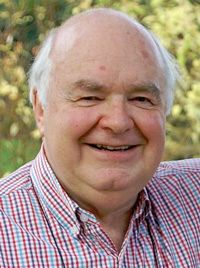
Noted Christian apologist John Lennox unfortunately believes that Genesis isn’t literal history, yet he admits
“the understanding of the days of Genesis as twenty-four-hour days seems to have been the dominant view for many
centuries”.
Despite being an articulate and effective evangelical spokesman for Christianity in many areas (e.g. he has publicly debated Richard Dawkins), British professor of mathematics and philosopher Dr John Lennox, in common with other long-age Christian compromisers, is severely hamstrung in his endeavours by his allowing of death-before-the-Fall. The atheists know of this ‘blind spot’ and exploit it to the hilt. Dawkins himself writes of it:
“Theologians worry about the problems of suffering and evil, to the extent that they have even invented a name, ‘theodicy’ … for the enterprise of trying to reconcile it with the presumed beneficence of God.”28Dawkins and other ‘militant’ atheists actually know that Christians who hold to a grammatical-historical reading of Genesis 1–11 have the only sure defence: the teaching of a literally perfect world, ruined by Adam’s sin and the subsequent Curse, now crying out to “be set free from its bondage to corruption and obtain the freedom of the glory of the children of God.” (Romans 8:21) No wonder Dawkins is actually willing to debate John Lennox and other long-age Christian compromisers, but steadfastly refuses to debate young-earth creationists! (See Box 1 below, where a secular interviewer refers to this.)
Just as the ABC, despite their overtly anti-Christian bias, was willing to give airtime to John ‘atheist-agree-fest’ Dickson, so too have they several times granted extended interviews to John Lennox and other well-known long-age Christians. And every time, usually after some diplomatic niceties, they go for the ‘natural evil’ question. Here’s ABC presenter Rachael Kohn, putting the challenge to John Lennox.29 (Warning: This and subsequent of his interview extracts reproduced here in brown font are rather lengthy but we do so both in fairness to Lennox and also to show that we are not misrepresenting his response to questions.) Note his “With difficulty” admission, and the fact that he is unable to give a proper answer, despite being given oodles of airtime to speak at length, uninterrupted, on the topic:
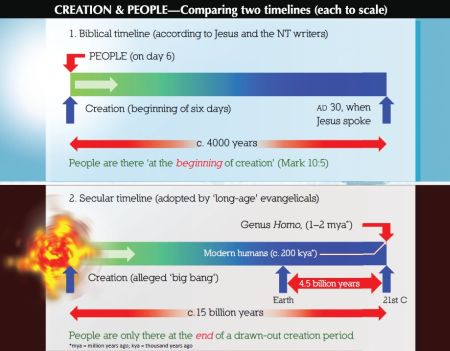
The ‘secular timeline’, from an alleged ‘big bang’ to
now, is unfortunately accepted by many people in the evangelical
Christian
world—even by some who strongly argue against evolution. However, this
billions-of-years timeline puts people at the ‘end’ of creation (see
diagram). But from
words that the Lord Jesus Christ, the Creator made flesh, spoke to His disciples, it’s plain that people were there from
the beginning of creation. This means that the world cannot be billions of years old.
RACHAEL KOHN: Well, John, suffering is one of the biggest tests of faith which challenges the concept of God as a loving protective father, the shepherd who goes and searches after his lost sheep and even stands in between the sheep and the wolf. Suffering can make that belief in God seem almost offensive, so how do you explain God’s existence in the depths of despair and suffering like that?
JOHN LENNOX: With difficulty. I find that this is a problem that we all face, and I’ve been in Auschwitz many times and I couldn’t help thinking, listening and debating with Peter Singer…the other night I went to a lecture the night after where we talked about his grandparents and he finished, it was very poignant, with a picture on the screen of his grandparents and his parents about to leave for Australia, and he said that’s the last picture of the family. And he just drew a veil over the fact that his grandparents had been murdered in the gas chambers. And I’ve been there many times and I have wept.
How shall I approach it, because it’s such a sensitive thing?
Cancer looks very different to an oncologist and the person who’s just been told they have a brain tumour. So there is an intellectual side to it and there is a pastoral side to it. I’m constantly having to wear one hat or the other, and I’m very sensitive to it. I flew into Christchurch two days after the earthquake and I had to meet people, one lady came in tears to me and she said, ‘I sat in my office, the wall fell, my friend was crushed to death instantly and I am left. Why?’ And my heart goes out to people like that.
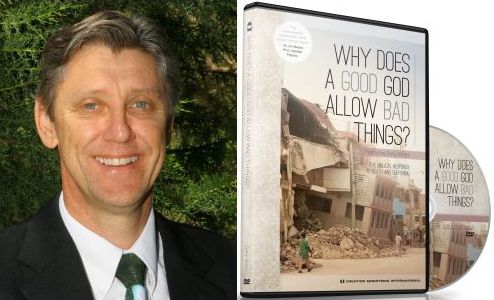
One of the most-asked questions is why a loving God
allows death and suffering—a question that even leading Christian
apologists cannot satisfactorily answer,
if they insist on holding to a billions-of-years age-of-the-universe.
CMI is receiving much excited feedback about the impact on people’s
hearts and minds of
this recording of CMI’s Gary Bates delivering the Gospel message with a powerful, yet
compassionate, approach, as he answers this key question.
And do you mind if I personalise it? Because we can argue about all kinds of things but…three years ago I nearly died and they didn’t expect me to live, I said goodbye to my wife, and I knew it was serious. One of the big blood vessels in the heart had clogged. But they saved my life.
So people say to me, well, you thank God for that don’t you. And I said, yes, I do. But that same year my 22-year-old niece had an earthquake in her brain and it was a tumour and she is gone, leaving a husband of a few months, you see. So there’s the pain. Now, whether you are hit by an earthquake in Christchurch which affects a lot of people or a tsunami, or you have an earthquake in your brain, the effect on you is the same, isn’t it.
So we come down to this. And Peter Singer brought this up, as he has every right to do. He said couldn’t a good God have done this and this and this. I’ve been through all these arguments over the years and I’m going to cut right through to the centre of it right now like this and say whatever we think God could, should, might, would have [done], we are facing a world with jagged edges. It’s raw, but it is partly beautiful. The atheist seeks to deal with that by saying, well, there is no God. So they feel they’ve solved the problem; the universe is just a brute fact. Some people, as Richard Dawkins puts it, have a good time but most people have a horrendous time. And he goes on to say it is obvious that at bottom there is no good, there’s no evil, there’s no justice, DNA just is and we dance to its music. Of course that’s sheer determinism and removes all morality. It also removes the criticism of what on Earth is the problem with evil if there is no evil. But let me not go down that philosophical road. Atheism thinks it has solved the problem, but it’s a hollow solution because it actually can make the pain worse because there is no hope.Pressed further by Rachael Kohn on this point, John Lennox points to the cross as his certainty—though even here he gives no coherent answer (not surprising, given his long-age textual mutilation of Genesis) as to why such suffering on the part of Jesus was necessary:
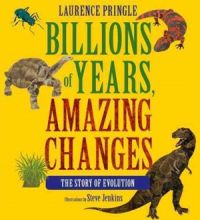
|
|
In contrast to the blithe naïveté of long-age Christians
who say ‘the age of the Earth is not an issue’, biblical creationists
are active
on the front line, countering atheistic books for children such as Billions
of years, amazing changes with the likes of the terrific new children’s Exploring
Geology with Mr Hibb book. The purpose of this book is to
prepare young ones before they get hammered at school with the
millions-of-years mantra (geology being the major
culprit of course).
|
|
JOHN LENNOX: … the major thing … to my mind is this; granted that there are those jagged edges and we all have these deep questions, and I stand in Auschwitz and I see those piles of hair, the piles of gold teeth, and I weep. And then I say granted that I’m standing in front of that, are there any grounds anywhere still to believe in God? And I believe there are. And the basic ground is this; at the heart of Christianity there’s a cross. If Jesus actually was the son of God, and I believe he was, it raises a very big question; what is God doing on a cross? And what that tells me at the least is this, that God has not remained distant from our human suffering but has become part of it.Just to show that John Lennox’s incapacity to answer wasn’t an aberration, he gave an almost-identical response in another extended interview on a different program three years previously, when another ABC presenter, John Cleary, issued the same challenge re the ‘problem of evil’ and asked how a supposedly all-powerful and good God could allow birth defects and disasters on the Earth—“Why not just fix them if he exists?” Note how evolutionist Cleary adroitly pursues the holes in Lennox’s response(s):30
JOHN LENNOX: Now right up front, I will admit to you that the hardest question I face as a Christian is the question of suffering, of deformed babies and all of that. Let me admit that. That’s the hardest question. I’ve been in Auschwitz many times and I’ve always wept. So that’s a real question to me, a real hard question.
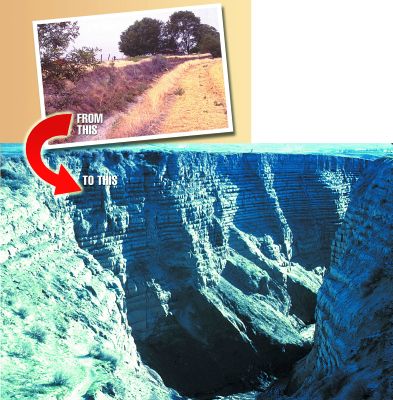
From a small irrigation ditch, to a canyon over 30 metres deep in just six days?! You don’t need
millions of years!
JOHN CLEARY: And let’s make the distinction here too, one can easily (and it’s been dealt with theologically for centuries) develop an argument about the human agency in cause and evil as an extension of the argument about free will. We’re not talking about that, we’re talking about evil which seems to be inherent in the structure of the universe, that is when an earthquake kills thousands, or when a child is born deformed. It’s that uncaused evil.
JOHN LENNOX: It’s usually called the problem of pain, as distinct from the problem of evil. My approach to it is this, and I would say I have no simplistic answers. I don’t think there are simplistic answers. But let’s suppose that it is a powerful argument for getting rid of God, so there is no God. So that’s it. That’s just how the universe is. So we solved the intellectual problem. But we haven’t removed the suffering. And we have removed all hope. So I want to re-phrase the question. I do believe in God so I have the problem. Are there any grounds for seeing a glimmer of hope in all of this? And I do believe that there are. You see, central to the Christian faith and I’ve thought about this a lot, because I’ve had to sit with people who have faced these things, both human evil and pain. Central to the Christian faith is the fact that the claim that God came into this world in the person of Jesus Christ, who died on the cross. Now many people think this is all mythology but just let’s try to think our way into it. Just suppose for a moment that this is true. That that’s God on a cross. The question is, what’s God doing there? Well it shows me at least this, that God has not remained distant from the problem of human suffering but has become part of it. That’s No.1.
No.2 is this: why I have hope and why I actually believe the story I’ve just told, is that death is not the end. If death is the end, as the atheists believe, it’s even worse than you say, because for example, no victim of terrorism will ever get justice. Hitler can gas 6-million Jews and all kinds of other people as well, then blow his brains out, and by definition he’s got away with it. He’s died a little bit earlier. You see, I can see the outrage of the New Atheists, but they have no basis for it. Let’s listen to Richard Dawkins on the foundations of morality for a moment. ‘The universe’, he says, ‘is just like we’d expect it to be if at bottom there’s no good, there’s no evil, there’s no justice. DNA just is a wee dance to its music.’ Well if that’s true there’s an end of all morality. It seems to me that a Christian like myself is presented with major problems, but they’re nothing like the problems of the atheist.
abc.net.au
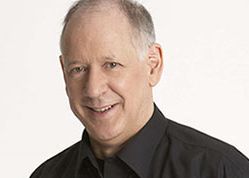
In the opinion of this article’s author (David
Catchpoole, of CMI–Australia), the ABC’s foremost presenter and
interviewer on religious topics is
John Cleary—who presents the live-to-air radio program Sunday Nights. However, to the author’s knowledge, there has never been a broadcast of Cleary
interviewing a biblical (i.e. young-earth) creationist Christian. What’s he frightened of?
JOHN CLEARY: Yes but there’s no ‘ought’ entailed in what Dawkins is saying. He is not saying that because this is the way it is, that’s the way it ought to be. And he’s not making an inference from science to morality, he’s simply saying out of that reality, that bleak reality we have to construct a morality.
JOHN LENNOX: Oh but just wait a moment. He’s saying there is at bottom, no justice. The human heart cries for justice. For Dawkins, like Michael Root and E.O. Wilson, morality is ‘an illusion fobbed off on us by our selfish genes to get us to co-operate.’ It’s much more serious than you’re suggesting. He has undermined the whole of humanity …
JOHN CLEARY: You’ve explained that in a negative sense; one could equally point that into a positive though, you could say, ‘Look, the power of evolution is that it has begun to help us evolve a moral sense.’
JOHN LENNOX: I’d simply see no evidence of that. I think that’s falling into the mistake that David Hume pointed out long ago, that you cannot get an ‘ought’ from an ‘is’, and Dawkins has admitted, and I admire him for this, that you can’t find morality, particularly the notion of absolute morality, on the basis of science. Einstein said it long ago.
JOHN CLEARY: You can base it on human community though. On the existence of human community in recognising that we have to get on together.
JOHN LENNOX: Ah but there’s the whole point; we have to get on together.
JOHN CLEARY: To survive.
JOHN LENNOX: That works very well, this utilitarian philosophy which is all around the world really, it works marvellously until I get enough power that I don’t care what you do to me, which is exactly where Hitler got.
JOHN CLEARY: And at that point, community struck back. It took a lot of effort, but community struck back and ultimately community struck back against Stalin. I mean you were there when the Berlin Wall fell.
JOHN LENNOX: Yes I was. But look, Stalin had 60-million victims. None of them have had any justice. The notion of justice for them is a complete illusion. I want to dig down much deeper. I don’t believe justice is an illusion, and therefore my Christian teaching tells me that there’s going to be a judgment, there’s going to be a final accountability.Lennox is right about that, but his argument is neutered by his own dismissing of the Genesis account. If John Lennox can’t trust the Judge on what He said about the age of the universe, then why trust His Judgment at all?
Certainly ABC presenter John Cleary showed no sign of being swayed by John Lennox’s arguments. And later in the interview Cleary successfully managed to get Lennox to speak out against biblical (i.e. young-earth) Christians, rebuking them for producing a ‘diversion’:
NASA/JPL/Space Science Institute

Saturn’s rings are increasingly recognized as being
relatively short-lived rather than essentially changeless over millions
of years. And
Saturn’s moons show evidence of being young, too. For more see Young Saturn.
JOHN CLEARY: I must ask you one question that hangs upon this, and in some ways it’s a side channel in other ways it’s not. This question of faith and evidence bedevils religion in another sense, in that you have those within religion, who are so obsessed with proving their religion or proving the Bible that they take science on. That is, they regard themselves as warriors against the conspiracy of science, the conspiracy of Darwinism. And I’m talking about Creationism. To what extent is this whole debate about Creationism that you get out of the United States, and it’s been in the newspapers from time to time, a dangerous diversion for those involved in serious religion?
JOHN LENNOX: I think it certainly is a diversion. The problem as I see it is some people are convinced not simply of Creationism in the old sense, that is, there is a Creator. They feel that the Bible is unequivocal in stating that the age of the Earth is very young and so on and so forth, and so the big things get lumped together with the lesser things. And the age of the Earth is for example virtually made a touchstone of doctrine, when there’s so much evidence out there in science against it. …Actually, Dr Lennox is absolutely wrong about the evidence and the age of the Earth. And he subsequently went on to tell John Cleary:

This photo, which can be seen on p. 26 in the booklet Stones and Bones,
was instrumental in the conversion (to Christ) of a New Zealand man,
who’d previously thought that stalagmites and stalactites needed
millions of years to form. The above
photo shows an array of stalagmites and stalactites inside a mining
tunnel at Mt Isa, Queensland, Australia (note for scale, helmeted
miners, bottom right). The tunnel was only
about 50 years old when this photo was taken.
JOHN LENNOX: I respect people who, like myself, believe in the inspiration of Scripture, it’s the word of God. But when you find equally godly, equally intelligent, this is now from a Christian perspective, people who disagree on certain things, they don’t disagree on the resurrection of Jesus, they don’t disagree on the fact that there was a creation. But when you see them disagreeing on things like the interpretation of the days, I think that is a warning that we need to be less dogmatic, and approach it much more humbly, and learn to distinguish what are the things about which we can be more certain, and what are the things about which we can be less certain?One thing we can be certain about, is that those who disagree on the interpretation of the days, do so not because of what the Bible says, but because of outside influences. In reviewing John Lennox’s book Seven days that divide the world, CMI’s Lita Cosner really ‘nailed it’:
So Lennox has no problem accepting the supernatural origin of human beings, the supernatural incarnation, or the supernatural Resurrection—all of which are scientifically ‘impossible’—for theological reasons. But he jettisons the timescale because he believes science demands it. If one is going to embrace the Bible’s teaching on origins and eschew the secular scientific consensus, why not do it wholeheartedly? As it is, it seems rather inconsistent, and one struggles to discern how Lennox chooses his positions.
Also, Lennox seems unaware that there are undoubted Homo sapiens fossils, ‘dated’—by methods Lennox implicitly accepts—at 195,000 years old.31 This is far older than Adam could possibly be,32 even allowing for the most elastic stretching of the Genesis 5 and 11 genealogies.33 This consideration alone should be enough to alert Lennox that his system must collapse.34When Lennox says, in relation to the age of the universe, that Christians “need to be less dogmatic”, he is only talking about Christians who hold to a young earth. In essence saying, “Be silent, Christians, re the young age of the universe!” But Lennox is not silent on his belief in millions of years. His call for Bible-believing Christians to be dumb (mute) on this issue is not only a call to suppress the truth (which, according to Romans 1:18, matches the aim of the wicked), but, coming from a fellow Christian, is just plain dumb besides.
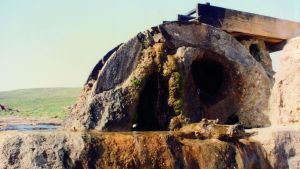
|
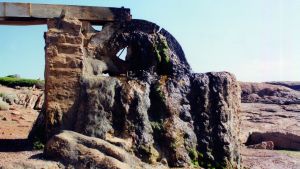
|
This wooden waterwheel, at Cape Leeuwin, Western Australia, is now completely encased in solid limestone—obviously
this rock formation did not need millions of years!
| |
There’s (sadly) many more …
There are many more examples we could have cited here, of well-known and respected Christian leaders, apologists and spokespeople, who defraud themselves of effective dealing with secular media, because of their acceptance of a billions-of-years age of the Earth and universe. (More examples of this ‘blessed inconsistency’ are included in Box 2, for those who are interested.) The few examples given here suffice to show how atheists, in certain circumstances and where they are in control of the microphone, allow Christians to have a voice—but generally only those Christians who accept billions of years, and then the atheists crow loudly over those Christians’ inability to answer the ‘problem of natural evil’.However, it doesn’t have to be that way.
What a difference a young-earth view makes!
Now, after more than a half-century of gathered evidence and the publication of scientific faith-endorsing materials by the modern young-earth creation movement, why any Christian would want to compromise with the secular billions-of-years timeframe is frankly perplexing. Especially given the fact that when the Gospel is presented to young people today, and they are shown from design in nature that there must be a Creator (Romans 1:20), the foremost questions arising from them concern the age of the universe.
Borgþór Magnússon, www.surtsey.is/index_eng.htm

|
Solarfilma, www.surtsey.is/index_eng.htm

|
Is the island at left old or young? Answer: it’s the same
one as appeared out of nowhere in the 1960s at right. Wave-cut
platforms, sheer cliffs, and rounded
boulders on the beach show you don’t need millions of years for those
features to form! For more on this see: Surtsey
still surprises!
| |
All the questions were on the age-of-the-Earth, radioactive dating and the nature-of-the-‘Intelligent Designer’. He said afterwards that he’d been very hard pushed to stick to the ID ‘pat answers’ as a young-earth creationist himself. I.e. it was very tough to logically represent the ID point of view because the strategy required him to dodge the very questions that were most on the young people’s minds!
In contrast, in the rare event that a Bible-believing ‘young-earth’ Christian is given airtime on the secular media, things are very different. A savvy atheist interviewer is unlikely to ask the ‘death-and-suffering’ question, knowing that the biblical creationist will be able to answer easily. (Indeed, when the ABC interviewed CMI-Australia’s Dr Don Batten, the question was never raised—see Box 1 below. What a difference a young-earth view makes!) Instead, the focus will be to try to mock the young-earth creationist for believing the Bible, and/or to mock and discredit the historical account in the Bible itself.
That’s because militant atheists know only too well that the logic of the Gospel depends on the Genesis no-death-before-sin account. Further, their evolutionary storyline needs a billions-of-years ‘wow’ factor to dupe the unwitting into thinking that anything, even evolution, is possible, given enough time. Hence, that’s why the ‘history wars’ provoke atheists to their greatest frenzy over the age-of-the-universe issue. It is their ‘line in the sand’ that they will defend at all costs—the ‘hill which they are willing to die for’. But a belief in biblical creation, supported today by half-a-century of scientific publications from the modern young-earth creation movement, equips Christians to boldly ‘Charge the hill!’ Let’s do it.
Illustration by Caleb Salisbury
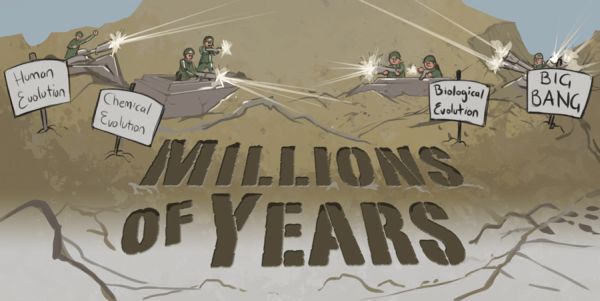
In the battle over biblical authority, there is a key position that is critical to hold against the
enemy’s attack, and that position is (surprisingly to some) the age of the Earth. For more, see
Charge the hill!
* * *
Box 1:
A rare event: Australia’s national broadcaster gives radio airtime to a biblical creationist
In 2010, many people complained to Australia’s national taxpayer-funded public television and radio broadcaster, the ABC (Australian Broadcasting Corporation), about its overtly one-sided coverage of the creation/evolution issue—particularly around the time of the first35 ‘Global Atheist Convention’ held in Melbourne, Australia. There had been a veritable ‘blitz’ of prime-time television and radio interviews with leading atheists visiting Australia for the convention, especially Richard Dawkins (who at the time was promoting his (then) latest book, The Greatest Show on Earth—the evidence for evolution).36
Dr Don Batten, of CMI-Australia, used to believe in billions of years, but not any more. See
Harvesting real fruit: Creation magazine talks with plant scientist Dr Don
Batten.
With the program due to be broadcast on all ABC local radio stations across the nation from 8:00–8:30am, Don duly fronted up to the ABC studio in Brisbane at the appointed early morning time, when he was told that the interview would not be broadcast live, but pre-recorded. Despite this breach of their promise, and of our pre-conditions for interview, Don went ahead with the interview. But it was never aired on the AM program at prime-time. Instead, some days later, it was broadcast only on the niche ABC ‘Radio National’ network (i.e. with a much smaller listenership), and certainly not at prime-time, but instead in the bleary-eyed mid-winter pre-dawn zone at 6:22a.m., with Don’s recorded words edited down to fit into less than five minutes of actual broadcast interview. (The presenter’s introduction goes for about one-and-a-half minutes.) The original interview was substantially longer—about 20 minutes—during which Don made several references to the many creation resources now available to anyone wishing to delve more deeply into the creation/evolution controversy, and a specific mention of our website, creation.com. He also presented many evidences re a young age of the Earth and the legacy of a global Flood (the sorts of things we’ve presented in many of the accompanying illustrations to this article)—but it turned out the ABC only allowed for one of them to go to air (polystrate tree fossils). (Ironically, atheists often challenge creationists to come up with evidence, but when Don did that for the atheist-supporting ABC, they weren’t so interested in broadcasting it, after all.)
Nevertheless, we are grateful that even just the edited-down version went to air—a substantial milestone and welcome anomaly in the history of ABC’s coverage (or more accurately, non-coverage) of the creationist position. Although the interviewer’s questions were no doubt asked from a hostile/challenging standpoint, he (James Carleton) was courteous, and some substantive points that Don made were not edited out of the broadcast. Here’s a transcript of the entire interview,37 interspersed with a couple of editorial notes of our own in square brackets:
JAMES CARLETON: Were you listening early in the year when Fran [viz., Fran Kelly—the usual host of this program] interviewed Richard Dawkins—the renowned atheist—and he gave a vigorous defence of Darwin’s theory of evolution? Religions obviously dispute Dawkins’ assertion that there is no God. But on evolution, Australia’s religions overwhelmingly have no problem with Dawkins. The Catholic church, most Protestant denominations, and nearly all Jews say science has it right. The Earth is 4.6 billion years old. All life has a common ancestor and DNA and fossils prove humans evolved from early apes 200,000 years ago in Africa. I said most, but not all—not all denominations agree. Some Low Church Protestants and ultra-Orthodox Jews say the Book of Genesis, in the Bible, is literally true. The Hebrew calendar tells us the Earth was created just 5,770 years ago. And the earliest life forms weren’t primordial bacteria, according to the Bible, but, of course, Adam and Eve.[Of course, the Bible doesn’t say that Adam and Eve were the first life forms. According to the Bible, God made Adam and Eve after He’d made the plants (Day 3), the sea creatures and flying creatures (Day 5) and the land-dwelling creatures (Day 6).]

This thought-provoking photo from p. 105 of The Young Earth
is testament
to rapid burial in the Flood. This fish was covered over so quickly it
didn’t even have time to finish swallowing its lunch! (No room for
millions-of-years.)
JAMES CARLETON [continued]: Among the religions who (and the religious who) believe this is an even smaller subset, those who say “Yes, the Bible is literally true, but there’s actually scientific evidence that points to this conclusion, not just the Bible.” Dr Don Batten is one of these people. In the 1970s, he earned his PhD in horticulture research, but for the last 15 years he’s been associated with the Brisbane Christian group, Creation Ministries International.
Dr DON BATTEN: As a scientist, I find that there’s abundant evidence that in fact God created things, that there is a Creator. And the idea that evolution, everything made itself over billions of years—“There’s no need for a Creator, no need for intelligent design”—I mean, that doesn’t add up. There has to be a cause outside of matter, which is eternal, and which is incredibly powerful, and that sounds awfully like the God revealed in the Bible, for example.
JAMES CARLETON: But isn’t that a position of faith, rather than a position of science?
DON BATTEN: No, not at all. Not at all.
JAMES CARLETON: Let me ask you, if you’d never read the Bible and had never heard of the story of Genesis, and had just seen the non-scriptural evidence as to the origins of the Earth, what would be your conclusion?
DON BATTEN: Well, that’s interesting because I actually accepted, pretty much, Richard Dawkins’ view of everything, at one stage.
JAMES CARLETON: You used to believe in the theory of evolution?
DON BATTEN: Yes, I would have been one of those people, like in the mainstream churches you talk about, that say “God used evolution”. And I accepted the billions of years and everything.
JAMES CARLETON: What changed your mind?
DON BATTEN: Well it was actually evidence that actually got me started on changing my mind.
JAMES CARLETON: Why does science, and indeed so much of religion, disagree with you? I mean, it’s one thing having scientists not agree with you. It’s another thing altogether having people who want to live their life by the Bible and see it as the written word of God—even they don’t agree with you!
DON BATTEN: Well, somebody who takes Jesus as their Saviour, should surely take what He says as the authority, in which case, they should believe what Genesis says about history, because Jesus took it as history.
JAMES CARLETON: And what does Genesis say? Remind us.
DON BATTEN: Well, Genesis tells us that God created things in six days.[This is one instance where the ABC program editor has truncated Don’s answer—evidently they wanted to focus on the ‘six days’ aspect.]
JAMES CARLETON: You’re saying there is evidence in addition to the Bible, that God created the Earth in six days?
Photo by Ian Juby

Spanning multiple layers, these tree trunk fossils could
not have formed by slow-and-gradual processes. (A tree standing out in
the open would rot at the top
before it could be covered over with sediment.) See Polystrate fossils: evidence for a young
Earth.
DON BATTEN: Certainly that it wasn’t billions of years ago like is generally believed, and widely believed, that’s for sure. You look at fossils, for example, things like polystrate trees. There’s actually tree trunks running through coal seams that are supposed to take millions of years to have formed, and the tree trunks have had the roots broken off and they’re standing vertically, but with the roots broken off—they’ve been transported there.
JAMES CARLETON: Why would the …
DON BATTEN: And you find that right through the fossil record, and right through … In fact, coal, for example, is a huge conundrum for the millions-of-years belief system.
JAMES CARLETON: Why would the world of geology, the world of Earth science, look at those same sequence of events and not come to the conclusion that the Earth is a few thousand years old?
DON BATTEN: Because they don’t have the right glasses on. You see, you’re brought up to think in a certain way, like I was brought up to think …
JAMES CARLETON: But those glasses you describe are biblical glasses, glasses of faith …
DON BATTEN: No, no, no, they’re secular glasses. There are two types of glasses. You can have on the secular glasses, where you’ve been brought up to think a certain way. It’s just taken on board. I mean, it’s just taken on board. From the scientific evidence, the evidence actually weighs up for thousands of years, not billions of years. The only way we can know that is a historical record, right? And the only historical record we have, a written record of an eyewitness, is actually the Bible, which is God’s Word. And even many mainstream geologists are saying there’s a huge amount of evidence for the global Flood the Bible talks about, and when you start looking at the rock record …
JAMES CARLETON: But they’re not concluding from that though that all the species of the world entered a boat that was captained by Noah.
DON BATTEN: Well, you have people all round the world with a story of a ‘great flood’ that only a few people survived, on a boat. Stories all around the world. Australian aborigines have stories of a great flood that only a few people survived. And they talk about it being a judgement from the Creator, and so on.
Photo by Don Batten
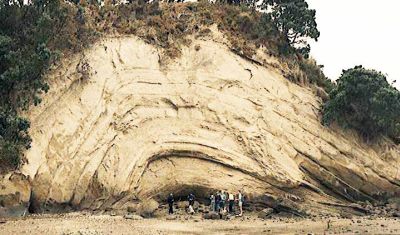
Radical folding at Eastern Beach, near Auckland in New
Zealand, indicates that the sediments were soft and pliable when folded,
inconsistent with a long time for
their formation. Such folding can be seen world-wide and is consistent
with a young age of the Earth.
JAMES CARLETON: What evidence do you have though that upon this Flood there was a boat, captained by Noah, that housed all the land species on Earth?
DON BATTEN: Well, we have a historical record in the Bible of the boat, but we also have the conclusion that if there was such a Flood, then there had to be some way of surviving it, because if it was global, there were wouldn’t be too much of the land animals, at least, that survived it.
JAMES CARLETON: And that would mean that upon this boat, there was what … Tyrannosaurus rex, along with wombats and koalas?
DON BATTEN: There were certainly representatives of all the types of animals on Earth—eight thousand land animals, animals that breathe through their nostrils. I mean, people add up and say, “There’s probably five million species.” Actually, nearly all the species are marine. You’re looking at huge numbers of insects, of microbes, and worms, and all sorts of things, and many of those would have survived on floating log mats, for example.
JAMES CARLETON: Professor Dawkins won’t debate so-called Young-Earth Creationists. But if he would debate you, what would you ask him?
DON BATTEN: Oh, well, in his book The God Delusion, he even suggested Jesus didn’t even exist, which is bizarre.
JAMES CARLETON: Why is that bizarre?
DON BATTEN: Well, the existence of Jesus—no historian would doubt that. I’m sure he doesn’t doubt that Julius Caesar existed, and there’s much less evidence that Julius Caesar existed than Jesus Christ existed.
JAMES CARLETON: Dr Don Batten, thank you very much for sharing your views with us today.
DON BATTEN: Thank you James, it’s been a pleasure.
JAMES CARLETON: And Dr Don Batten is from the Brisbane Christian group, Creation Ministries International.
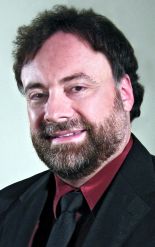
|

|
Long-ager Dr Hugh Ross (right), founder of Reasons to Believe, certainly knows of Dr Jonathan Sarfati’s comprehensive book
Refuting Compromise,
written to rebut Ross’s long-age view. But Dr Ross has never publicly even mentioned Jonathan’s book, and has
persistently refused a string of opportunities to publicly debate him. We’re not necessarily
lumping him in with the “suppress the truth” crowd mentioned in Romans 1:18, but …
| |
Box 2:
Norman Geisler’s ‘[not-so-] blessed inconsistency’
The importance of taking a strong stand on biblical creation, compared to a passive stance or worse (i.e. a long-age view), is highlighted in the following extract from Dr Jonathan Sarfati’s 2003 article, Shame on Charisma!: Leading Pentecostal magazine promotes Hugh Ross compromise and denigrates biblical creationists. The dramatis personae include ex-evangelist Charles Templeton who renounced his faith (see Death of an apostate), lifelong evangelist Billy Graham, along with long-age Christian apologists Lee Strobel and Norman Geisler, as well as Hugh Ross of ‘Reasons to Believe’ [RTB].The extract begins in the context of Charles Templeton’s stated objections to the Bible, many of which related to to the origins issue and thus the accuracy of the book of beginnings—Genesis. (For detail on this see: The slippery slide to unbelief: A famous evangelist goes from hope to hopelessness.)
However, the main thing to note is how leading Christian apologist Norman Geisler’s response to Templeton about animals killing each other is actually correct—God didn’t make them that way—but he doesn’t understand the inconsistency of his answer with his billions-of-years belief, as Jonathan Sarfati indicates:38
Alas, Billy Graham, who has never taken a strong stand on biblical creation, never even tried to address Templeton’s objections, and instead preferred the fideistic approach of blocking out difficulties and accepting the Bible by blind faith. This disgusted Templeton, who claimed ‘He committed intellectual suicide by closing his mind’ (see also Death of an apostate). Romans 1:18 ff. suggests that Templeton’s objections are ultimately pseudo-intellectual smokescreens for a willing rejection of God. But that did not absolve Graham of his responsibility to give an answer (1 Peter 3:15).
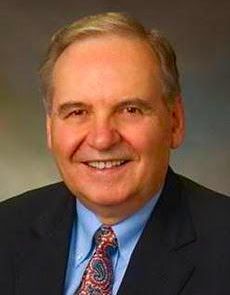
Dr Geisler answers the animal-death question
correctly—but doesn’t realize that in doing so he is contradicting his
personal belief in billions of
years.
The crime journalist and popular-level Christian apologist Lee Strobel interviewed Templeton shortly before his death after a long battle with Alzheimer’s. In his book The Case for Faith,39 Strobel interviewed scholarly apologists about responses to the strongest objections to Christianity, i.e. doing what Graham failed to do. Strobel based these objections largely on Templeton’s book and interview notes. Strobel and some of his interviewees are old-earth creationists, but it’s notable how the question of animal suffering is addressed.
Templeton wrote:
‘The grim and inescapable reality is that all life is predicated on death. Every carnivorous creature must kill and devour another creature. It has no option. How could a loving and omnipotent God create such horrors? … Surely it would not be beyond the competence of an omniscient deity to create an animal world that could be sustained and perpetuated without suffering and death.’40
Strobel put this to Norman Geisler, a leading evidentialist apologist, and strong supporter of old-earth creationism, although he has helped young-earth creationists in court.41 Geisler responded:
[Reads from Genesis 1:29–30] …‘[Y]es, God can create those kind [sic] of animals. And the fact is, He did. The original paradise had those kind of animals and the paradise to come—the paradise restored—is going to have those kind of animals. In fact, we are told that God originally created animals and human beings to be herbivorous. …
‘God did not create animals to be eaten in paradise, and animals weren’t eating each other. The prophet Isaiah said someday God will “create a new heavens and a new Earth” where “the wolf and the lamb will feed together and the lion will eat straw like an ox.” In other words, there’s not going to be the same kind of killing that goes on now.
‘In sum, everything God created was good. What changed things was the Fall. When God was told, in effect, to shove off, he partially did. Romans 8 says all creation was affected—that includes plant life, human beings, animals, everything. There were fundamental genetic changes; we see, for instance, how life spans rapidly decreased after the Fall [sic]. God’s plan was not designed to be this way; it’s only this way because of sin. Ultimately it will be remedied.’42
This is significant, because Geisler is a hostile witness, yet his response is essentially identical to that of young-earth creationists! This shows how a leading apologist realizes that the only way to answer the objections of Templeton et al. is with the biblical teaching that death and suffering resulted from sin. However, he fails to realize that this totally contradicts his old-earth belief. Ross is more consistent—he wants to keep billions of years at all costs, so rejects teaching like Geisler’s above. However, Geisler wrote the following endorsement for Ross’s book Creation and Time (back cover):
‘Creation and Time is the best book on the topic in print. It is a must for anyone interested in the conflict between science and Scripture. Dr. Ross’s pleas to overzealous “young earthers” not to make the age of the Earth a test of orthodoxy is long overdue.’
However, as we often point out, the ‘young Earth’ is not per se the test of orthodoxy. The issue is not so much the age of the Earth, but the authority of Scripture. Rather, the ‘young Earth’ is a deduction from other beliefs which are orthodox, including the sin-death causality accepted by Geisler himself, as shown above! Since Ross’s book explicitly contradicts the apologetic arguments Geisler explicitly stated, one must wonder how carefully Geisler read the book before endorsing it.
It also shows that many old-earth apologists, e.g. Geisler and Strobel, have not carefully thought through the issues and don’t realize the contradictions in their views. This should be remembered when Ross appeals to people like Geisler et al. in support. It’s notable that Ross is aware of Strobel’s book, since his RTB staffers discussed it in his audio series43 but of course they didn’t mention Geisler’s answer! Conversely, those who have thought through the issues and still desire to hang on to billions of years, such as Ross, must necessarily hold to unscriptural views on death as well as the age of the Earth.
Related Articles
Further Reading
References
- King, T., UWA backs away from climate change debate, Farm Weekly, www.farmweekly.com.au/news/state/agribusiness/general-news/uwa-backs-away-from-climate-change-debate/2306898.aspx, 4 October 2011. Return to text.
- In education, the term ‘vice-chancellor’ does indeed refer to the chief executive (not his deputy) at British universities and those of Commonwealth countries (Australia, New Zealand, Canada, etc.). Some American universities also use the term. Return to text.
- I.e. human-caused. Return to text.
- The University of Western Australia—Highlights: Community Resource, http://www.uwa.edu.au/university/highlights#Community, acc. 13 September 2012. Return to text.
- The University of Western Australia—The University: International Community, http://www.uwa.edu.au/university, acc. 13 September 2012. Return to text.
- The University of Western Australia: Strategic Directions 2009–2013, http://www.uwa.edu.au/university/strategy, acc. 13 September 2012. Return to text.
- http://climatecommission.gov.au/about/tim-flannery/, acc. 1 January 2013. Return to text.
- http://www.findanexpert.unimelb.edu.au/display/person67077, acc. 1 January 2013. Return to text.
- For readers with further interest in this topic, see the articles: Erring on the side of censorship: US schools are becoming Christ-free zones, The attitude of various populations toward teaching creation and evolution in schools, Is there a future for Christian education?, Australian Christian schools in creationism row: Many are calling this the thin end of the wedge for Christians everywhere …, Creation and Evolution: teaching two histories, More ‘monkey business’ in Tennessee?, The teaching of creation in schools, Government school classrooms: temples of humanism?. Return to text.
- From a transcript of the Australian public broadcaster ABC program Q&A, “A Show about Nothing”—broadcast Monday 18th February, hosted by Tony Jones, www.abc.net.au/tv/qanda/txt/s3687812.htm. Panel members were Lawrence Krauss, John Dickson, Tanya Plibersek, Greg Hunt and Cindy Pan. Return to text.
- Halloway, A., Reiss resigns as Royal Society stifles debate on evolution, creation.com/reiss-resigns-as-royal-society-stifles-debate-on-evolution, 23 September 2008. Return to text.
- Michael Reiss, Should creationism be a part of the science curriculum? The BA Festival of Science, Liverpool, 11 September 2008, http://www1.the-ba.net/bafos/press/showtalk2.asp?TalkID=301 (link no longer active). Return to text.
- James Randerson, Teachers should tackle creationism, says science education expert, The Guardian, 11 September 2008, http://www.guardian.co.uk/science/2008/sep/11/creationism.education. Return to text.
- At the time of writing (March 2013), there are moves afoot in many western countries to introduce draconian legislation, under the guise of ‘anti-discrimination laws’, which are specifically designed to curb free speech on the issue of religion—akin to what already exists in many Islamic countries. As one observer noted, “This is a brutal way, not of settling debates, but of ensuring they don’t take place at all.” Return to text.
- I.e. those Christians who hold to any of the claimed ‘godly’ long-age compromise teachings such as gap theory, progressive creation/day-age theory, theistic evolution/evolutionary creation, framework hypothesis. Return to text.
- Often incorrectly attributed to Martin Luther—see Wieland, C., Where the battle rages—a case of misattribution, creation.com/battle-quote-not-luther, 4 February 2010. (The misattribution is understandable given that the novel from which the words are sourced was commissioned by an editor who wanted a story about Martin Luther.) Return to text.
- Charles, E., The Chronicles of the Schönberg-Cotta Family, Thomas Nelson, 1864. Return to text.
- Krauss also went on to say that “withholding knowledge” is also “child abuse”. Indeed, we would say that knowledge of creation should not be withheld from children (Deuteronomy 4:9, 11:9; Ephesians 6:4). But of course Krauss’s intended meaning is that withholding the teaching of evolution from schools is child abuse. But he’s wrong to cast that slur on Christian schools, as CMI is not aware of any Christian school that doesn’t fulfil their educational curriculum responsibilities, i.e. they do teach what the curriculum demands re evolution. In fact, CMI’s position is that we would like to see evolution taught ‘warts and all’—and here’s a testimony from a Year 12 student that vindicates this approach. Return to text.
- Zuidam, B., Does Genesis allow any scientific theory of origin?—a response to J.P. Dickson, http://creation.com/john-dickson-vs-genesis, 22 January 2012. Return to text.
- Genesis 1 and theories of origin, http://creation.com/genesis-dickson-zuiddam, 16 February 2012. Return to text.
- In Dickson’s case, the renowned Moore Theological College in Sydney, Australia. If Dickson is representative as ‘fruit’ of what such non-literal-Genesis colleges teach, it goes a long way toward explaining the decline in the church. See, e.g., Crisis in the colleges, Evangelical colleges paid to teach evolution, Tabor’s choice, Time to think, Morality+Salvation History=Ignorance+Unbelief. Return to text.
- William Lane Craig: Young-Earth Creationism is an Embarrassment, http://www.youtube.com/watch?v=VEQhPvtvc1w, 23 January 2013. Return to text.
- Hallquist, C., William Lane Craig: Young-Earth Creationism is an Embarrassment, http://www.patheos.com/blogs/hallq/2013/02/william-lane-craig-young-earth-creationism-is-an-embarrassment/, 17 February 2013. Return to text.
- Does God exist? William Lane Craig vs Stephen Law, Westminster Central Hall, London, October 2011, http://www.youtube.com/watch?v=w7FhphWDokA. Return to text.
- Can animals suffer? Debunking William Lane Craig and other philosophers who say no, http://www.youtube.com/watch?feature=player_embedded&v=mLSwRcvX72M, 3 October 2012. Return to text.
- William Lane Craig and the problem of pain, Pharyngula (PZ Myers blog), http://scienceblogs.com/pharyngula/2011/11/08/william-lane-craig-and-the-pro/, 8 November 2011. Return to text.
- Cline, A., William Lane Craig: Animals aren’t aware of their pain, About Agnosticism/Atheism, http://atheism.about.com/b/2011/11/22/william-lane-craig-animals-arent-aware-of-their-pain.htm, 22 November 2011. Return to text.
- Dawkins, R., The greatest show on Earth—the evidence for evolution, p. 392. CMI’s response to this is Dr Jonathan Sarfati’s book-length critique, The Greatest Hoax on Earth?, available from your nearest CMI office or creation.com/store. Return to text.
- From a transcript of the Australian public broadcaster ABC Radio National program The Spirit of Things, “An evening with John Lennox”—broadcast Sunday 7th August 2011, hosted by Rachael Kohn, http://www.abc.net.au/radionational/programs/spiritofthings/an-evening-with–john-lennox/2928496. (Held in conjunction with the Centre for Public Christianity.) Return to text.
- From a transcript of the Australian public broadcaster ABC Radio National program The Religion Report, hosted by David Rutledge, http://www.abc.net.au/radionational/programs/religionreport/john-lennox/3165090,—the interviewer was the ABC’s John Cleary and the interview was recorded during John Lennox’s visit to Australia in 2008, and broadcast Wednesday 14th January 2009. Return to text.
- McDougall, I., Brown, F.H. and Fleagle, J.G., Stratigraphic placement and age of modern humans from Kibish, Ethiopia, Nature 433(7027):733–736, 17 February 2005. Return to text.
- Sarfati, J., The Fall: a cosmic catastrophe: Hugh Ross’s blunders on plant death in the Bible, J. Creation 19(3):60–64, 2005. Return to text.
- Not that they can be stretched, since they are strict chronologies. See Freeman, T., The Genesis 5 and 11 fluidity question, J. Creation 19(2):83–90, 2005,; Sarfati, J., Biblical chronogenealogies, J. Creation 17(3):14–18, 2003; Cosner, L., Can Christians believe dogmatically that the Earth is 6,000 years old?, 19 December 2009. Return to text.
- Cosner, L., Who is being divisive about Creation?—A review of Seven Days that Divide the World by John Lennox, Journal of Creation 26(3):25–28, December 2012. Return to text.
- Another one was held two years later—which seemed to attract not as much media coverage as the 2010 event. Return to text.
- E.g., Richard Dawkins releases new book on human evolution, ABC Radio National PM program, broadcast Wednesday 3 March 2010, transcript at www.abc.net.au/pm/content/2010/s2835697.htm. [Interview aired at 6:28 p.m.]. Return to text.
- Transcribed from the broadcast audio of: Creationism twist [an interview with CMI’s Dr Don Batten], ABC Radio National Breakfast program, broadcast Monday 14 June 2010, audio accessible online (as at 1 March 2013) at www.abc.net.au/radionational/programs/breakfast/creationism-twist/3044358. [Interview aired at 6:22 a.m.]. Return to text.
- Sarfati, J., Shame on Charisma!: Leading Pentecostal magazine promotes Hugh Ross compromise and denigrates biblical creationists, creation.com/shame-on-charisma, 29 May 2003. Return to text.
- Strobel, L., The Case for Faith, Zondervan, Grand Rapids, MI, 2000. Return to text.
- Templeton, C., Farewell to God, McLelland and Stewart, Toronto, 1996, pp. 197–199. Return to text.
- Geisler, N.L., with Brookes, A.F. and Keough, M.J., The Creator in the Courtroom—“Scopes II”: The 1981 Arkansas Creation-Evolution Trial, Fromm Intl., 1982. Return to text.
- Geisler, N., cited in Strobel, L., The Case for Faith, Zondervan, Grand Rapids, MI, 2000, 176–177. Return to text.
- Ross, H., Rana, F., Samples, K., Harman, M. and Bontrager, K., Life and Death in Eden, The Biblical and scientific evidence for animal death before the Fall, audio cassette set, Reasons to Believe, 2001. Return to text.
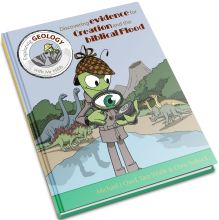
No comments:
Post a Comment